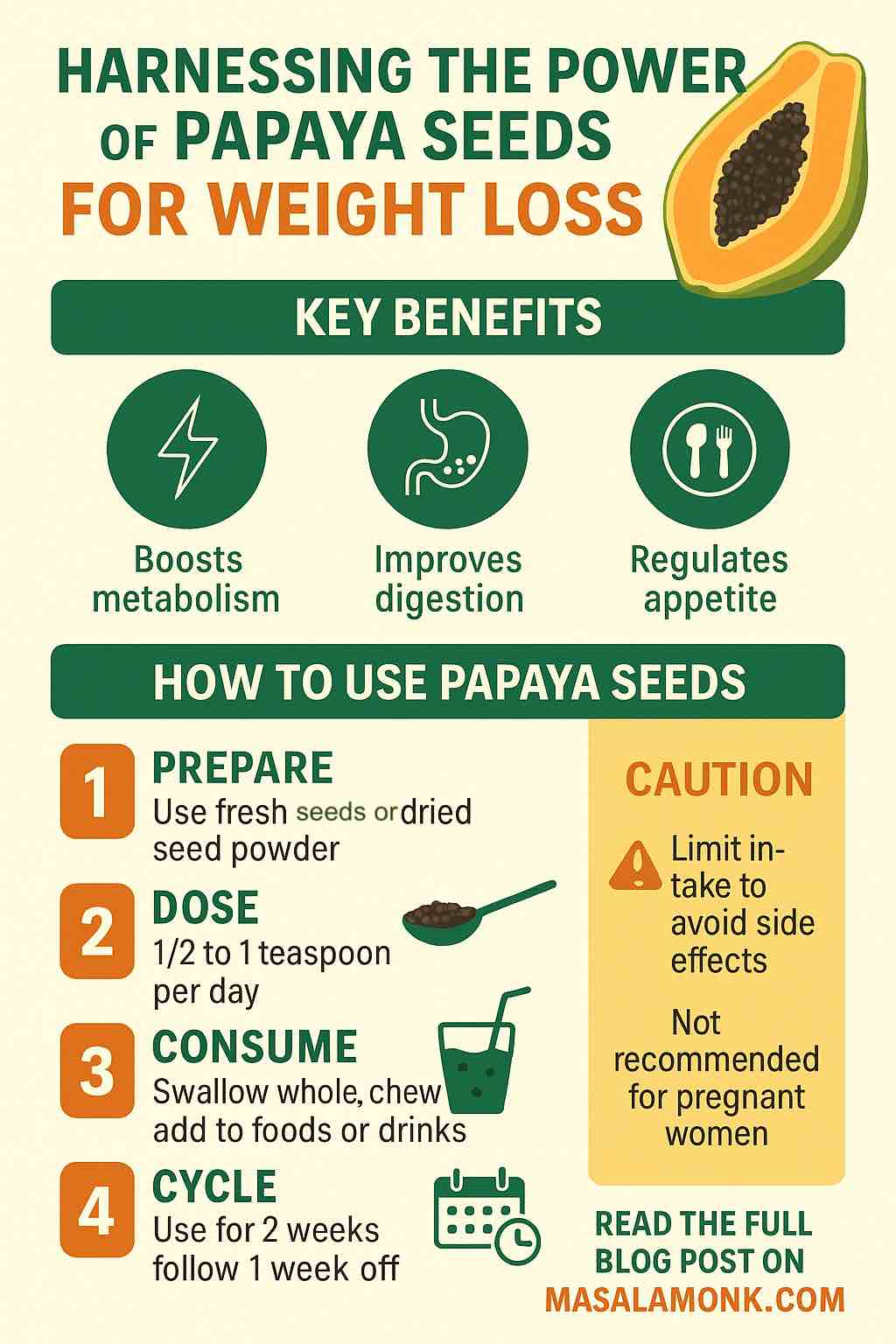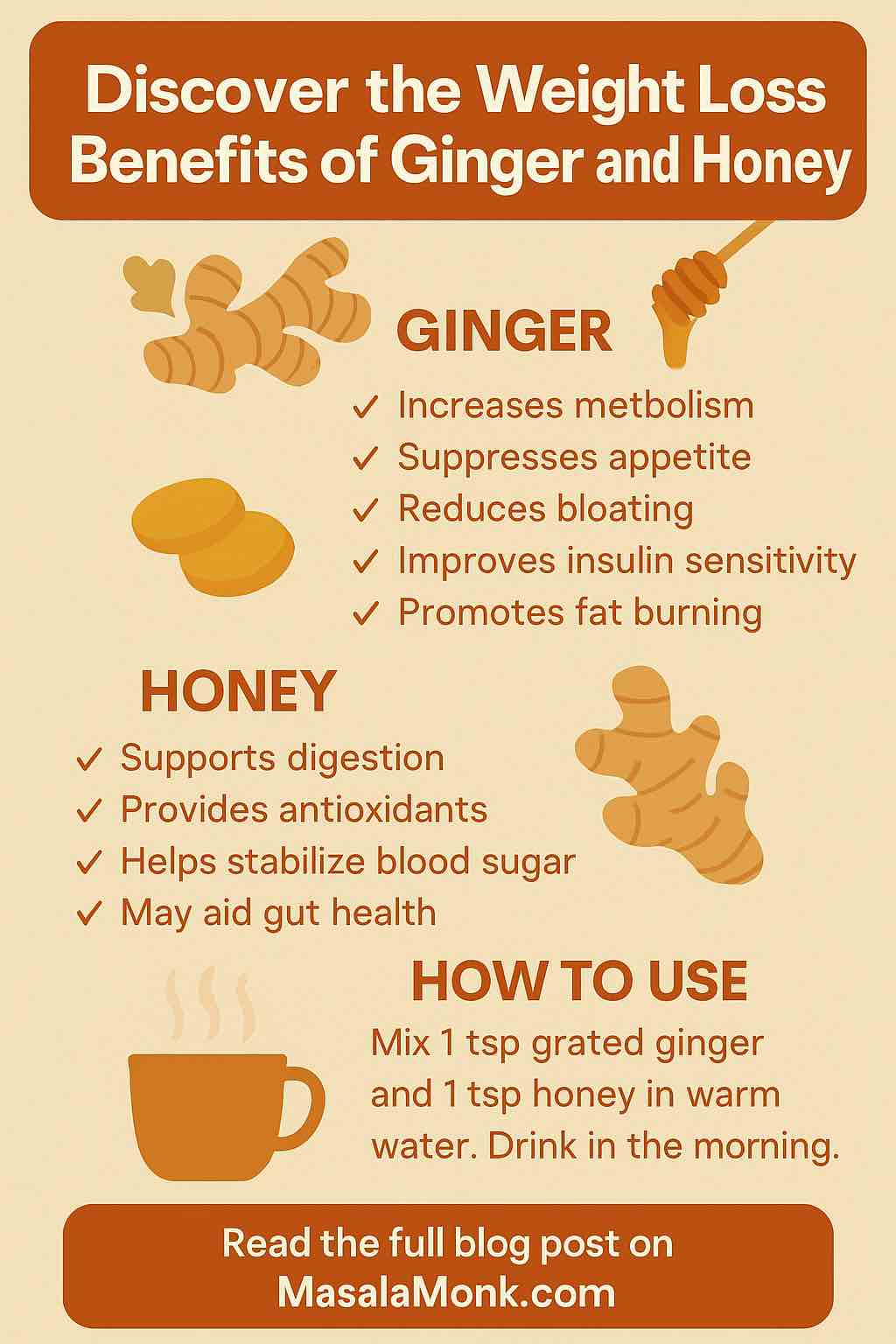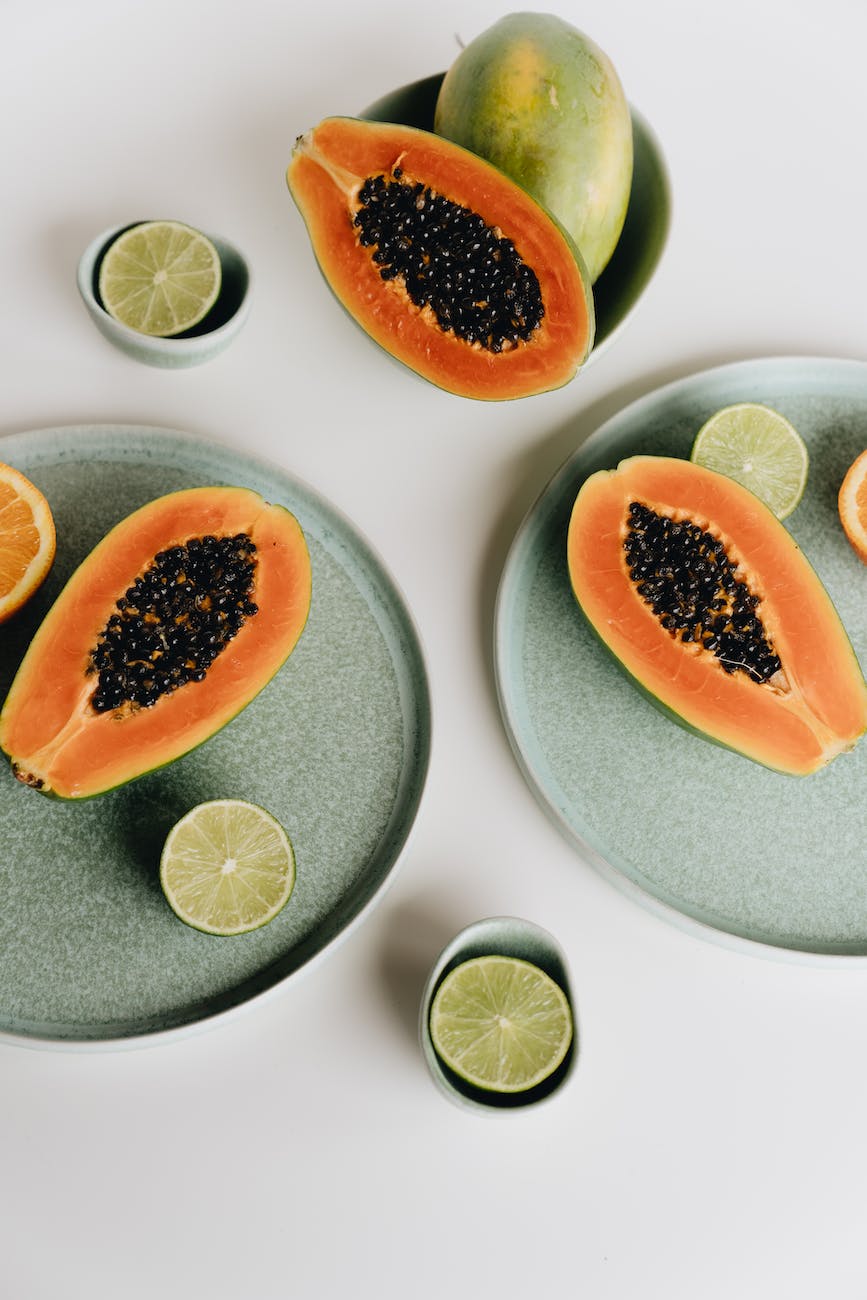
In a world obsessed with quick fixes and fad diets, nature often holds the most powerful solutions. One such underappreciated superfood? Papaya seeds. Often discarded, these tiny black seeds are nutritional powerhouses that may help support weight loss, improve digestion, and promote overall health when used correctly. This blog post dives into the science, safety, and step-by-step use of papaya seeds for weight management, giving you a practical guide backed by research.
1. The Hidden Gem: What Are Papaya Seeds?
Papaya seeds are the small, peppercorn-like seeds found at the center of the tropical papaya fruit. They have a sharp, slightly bitter flavor, resembling mustard or wasabi due to compounds like benzyl isothiocyanate. For centuries, they’ve been used in traditional medicine across Asia, Africa, and South America for their antiparasitic, antibacterial, and digestive properties.
2. Nutritional and Bioactive Composition
Papaya seeds contain a potent mix of:
- Fiber: Helps promote satiety and supports digestive regularity.
- Papain: A digestive enzyme aiding protein breakdown.
- Benzyl isothiocyanate (BITC): Possesses antimicrobial and potential anti-cancer effects.
- Phenolic compounds and flavonoids: Offer antioxidant and anti-inflammatory benefits.
- Monounsaturated fatty acids (MUFA): Like oleic acid, beneficial for heart health.
These compounds work synergistically to boost metabolism, reduce inflammation, and improve nutrient absorption—critical factors in sustainable weight management.
3. Scientific Evidence: What Research Tells Us
Though direct human trials on weight loss using papaya seeds are still scarce, a body of indirect evidence exists:
- Animal Studies: Research in rodents shows reduced appetite and weight gain when administered papaya seed extracts. Leptin modulation—a hormone involved in hunger regulation—was observed.
- Antiparasitic Effects in Humans: A 2007 clinical study showed that children given a papaya seed-honey mix had a 76.7% parasite clearance rate versus 16.7% in controls.
- Digestive Health: Papain and fiber-rich content help improve digestion, reducing bloating and supporting nutrient metabolism.
- Liver Support: Some animal studies report hepatoprotective effects, which may aid fat metabolism and detox—important for effective weight loss.
While promising, these benefits need validation in large-scale human trials specifically targeting weight loss.
4. Step-by-Step Guide to Using Papaya Seeds for Weight Loss
Step 1: Sourcing and Preparation
- Fresh Seeds: Scoop them out from a ripe papaya.
- Drying: Rinse and air-dry them for 3–5 days on a paper towel until fully dehydrated.
- Storage: Store in an airtight jar away from moisture and light.
- Grinding: For ease of use, grind dried seeds into a coarse powder.
Step 2: Dosage Guidelines
Start small to test tolerance. General recommendation:
- Beginner Dose: 1/4 teaspoon (approx. 5–7 seeds) per day.
- Moderate Dose: 1/2 teaspoon daily.
- Max Limit: Do not exceed 1 teaspoon/day (about 15 seeds) for extended periods.
Cycle usage: 2 weeks on, 1 week off.
Step 3: Consumption Methods
- Raw Chew: Swallow whole seeds or chew if tolerable.
- Smoothie Add-In: Add to green smoothies or protein shakes.
- With Lemon Water: Mix powdered seeds into warm lemon water.
- With Ginger/Honey: Combines well for digestive synergy.
Take them in the morning on an empty stomach or before meals to help curb appetite.
5. Safety Considerations and Warnings
Moderation is key. Though papaya seeds are natural, their concentrated compounds can have adverse effects in high doses:
- Liver Concerns: Excess BITC may harm liver cells if consumed chronically.
- Fertility Impacts: Animal studies suggest male fertility suppression at high doses.
- Pregnancy Warning: Not recommended for pregnant or breastfeeding women.
- Possible GI Effects: Nausea, bloating, or diarrhea in sensitive individuals.
Always consult a healthcare provider if you have underlying conditions.
6. Integrating Papaya Seeds into a Healthy Lifestyle
Papaya seeds are not a magic bullet. Their effectiveness increases when paired with:
- Balanced Diet: High in fiber, lean proteins, and low-glycemic carbs.
- Regular Physical Activity: Cardio + strength training.
- Hydration: At least 2 liters of water daily.
- Sleep & Stress Management: Critical for hormonal balance.
Use papaya seeds as a supportive tool—not a sole solution.
7. Final Thoughts: Should You Try Papaya Seeds for Weight Loss?
Papaya seeds offer a compelling blend of digestive, antimicrobial, and metabolic benefits that could support a weight loss plan when used thoughtfully. They’re inexpensive, accessible, and backed by emerging—but promising—scientific data.
However, their potency means they should be used in small, controlled amounts, with cycles and caution. Think of them as a supplement to your health toolkit, not the centerpiece.
With nature’s help and a balanced lifestyle, even small seeds can lead to meaningful transformation.
Disclaimer: This guide is for informational purposes only and does not constitute medical advice. Always consult a healthcare professional before making dietary changes.
Have you tried papaya seeds? Share your experience or questions in the comments below!
✅ 10 FAQs about Papaya Seeds for Weight Loss
1. Can papaya seeds really help with weight loss?
Papaya seeds can support weight loss indirectly by improving digestion, reducing bloating, and possibly curbing appetite due to their fiber and enzyme content. However, they are not a standalone fat-burning solution and work best alongside a balanced diet and exercise.
2. How many papaya seeds should I take daily?
Start with 1/4 teaspoon (5–7 seeds) and gradually increase to a maximum of 1 teaspoon per day. Always cycle usage (e.g., 2 weeks on, 1 week off) and monitor for side effects.
3. When is the best time to consume papaya seeds?
The ideal times are in the morning on an empty stomach or 20–30 minutes before a meal, which may help control appetite and improve digestion.
4. Can I swallow the seeds whole?
Yes, you can swallow them whole or chew them. Chewing releases more of their active compounds but also intensifies their bitter taste. Grinding and mixing into drinks is often more palatable.
5. Are there any side effects of papaya seeds?
In large or prolonged doses, they may cause nausea, diarrhea, liver stress, or reduce male fertility (based on animal studies). Avoid if pregnant, breastfeeding, or if you have liver issues.
6. Can I use store-bought papaya seeds?
It’s best to use fresh seeds from ripe papayas and dry them yourself to ensure purity. Some health stores sell dried or powdered papaya seeds, but check for quality and additives.
7. Are papaya seeds safe for everyone?
No. They should be avoided by pregnant or breastfeeding women, and used cautiously by people with liver conditions or fertility concerns. Always consult a healthcare provider if unsure.
8. How do I prepare papaya seeds for daily use?
Scoop from ripe fruit, rinse, air-dry for 3–5 days, then store in a dry, airtight jar. Grind into powder or keep whole for chewing or blending into drinks.
9. Can children consume papaya seeds?
While one study showed antiparasitic effects in children, routine use for weight loss is not recommended without medical supervision due to lack of safety data in minors.
10. Will papaya seeds interfere with medications?
There’s limited research, but due to their enzyme and antimicrobial activity, they could interact with digestion-related or liver-metabolized medications. Consult a doctor before use if you’re on any regular medication.













